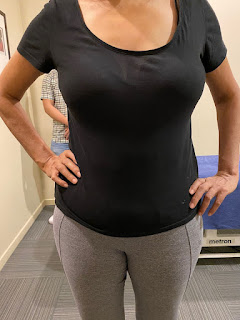Then I recall reading a paper published last July 2021 that it may be Covid-19 that can cause frozen shoulder (rather than the vaccination injections).
Covid-19 symptoms were mild in 5 of the patients, were the other 7 were asymptomatic. None of the patients were severely or critically ill. 2 of the patients had diabetes that were well controlled. You can read more about that study and how the authors suggested AC can be caused by Covid-19 here.
 |
| Can't do L hand on hip |
We really do not know what causes AC. Even doctors and research scientists are not sure either. However, we do know that AC afflicts women more commonly than men. Especially women above 50, more so if they are diabetic, had a prior stroke or thyroid disorders. Sometimes, it occurs after a recent shoulder surgery as well.
There seems to be some recent evidence that AC is a metabolic condition. Meaning if you're hypertensive, overweight, you drink, smoke, you have a poor diet and do little or no exercise, then you have a higher chance of getting AC.
There are usually 3 stages with AC. The first stage is the 'freezing' stage where pain is increasing with most shoulder movements. End range of motion in the shoulder starts to be limited. This stage can last from 3 to 6 months.
The next stage is the 'frozen' stage. There usually isn't as much pain as the first stage but shoulder range is definitely more limited. Patients often complain of increasing 'stiffness' in this stage.
The last stage is known as the 'thawing' state where shoulder range starts to improve. There is usually much less pain during this stage.
AC can last between 9 to 18 months. I've seen some patients get a whole better after 6 months although it can drag for up to 24 months in other patients.
I will write how we can help with AC in my next post. Stay tuned.
Reference
Ascani C, Passaretti D, Scacchi M et al (2021). Can Adhesive Capsulitis Of The Shoulder Be A Consequence Of Covid-19? Case Series Of 12 Patients. 30(7): E409-413. DOI: 10.1016/j.jse.2021.04.024





No comments:
Post a Comment